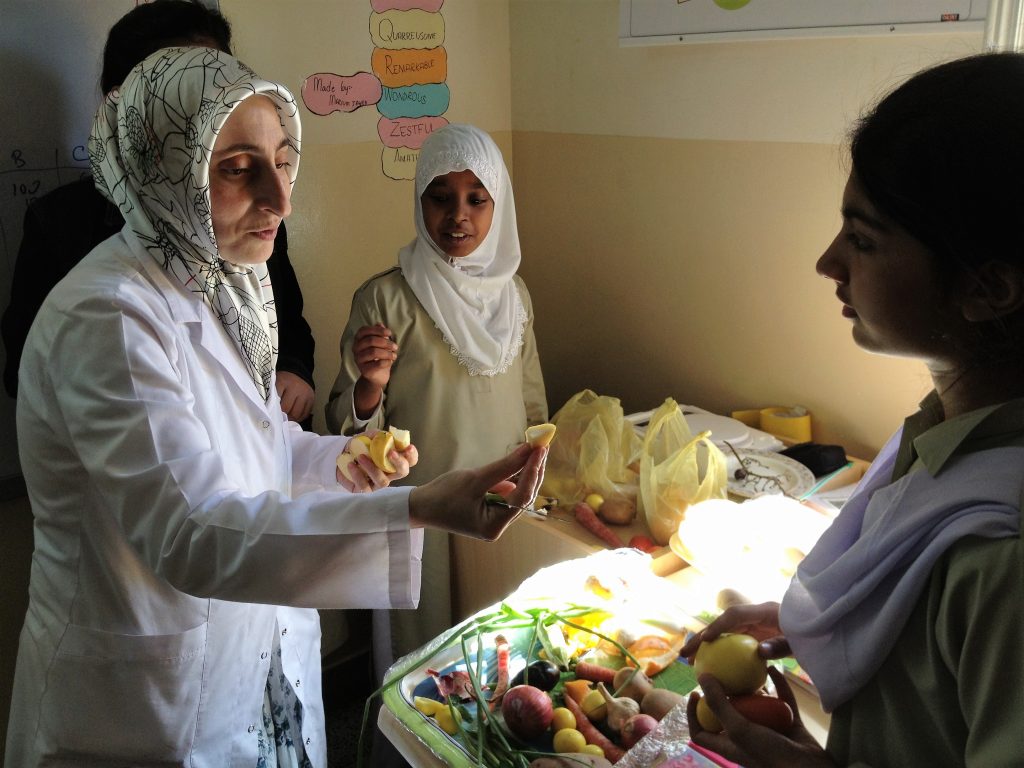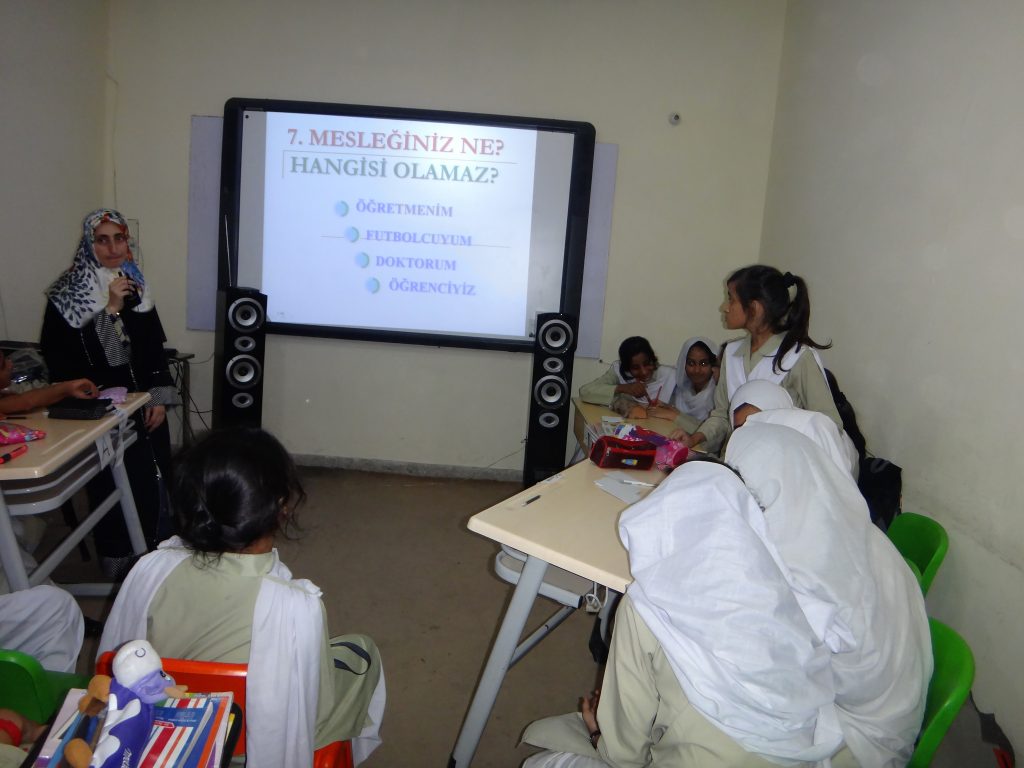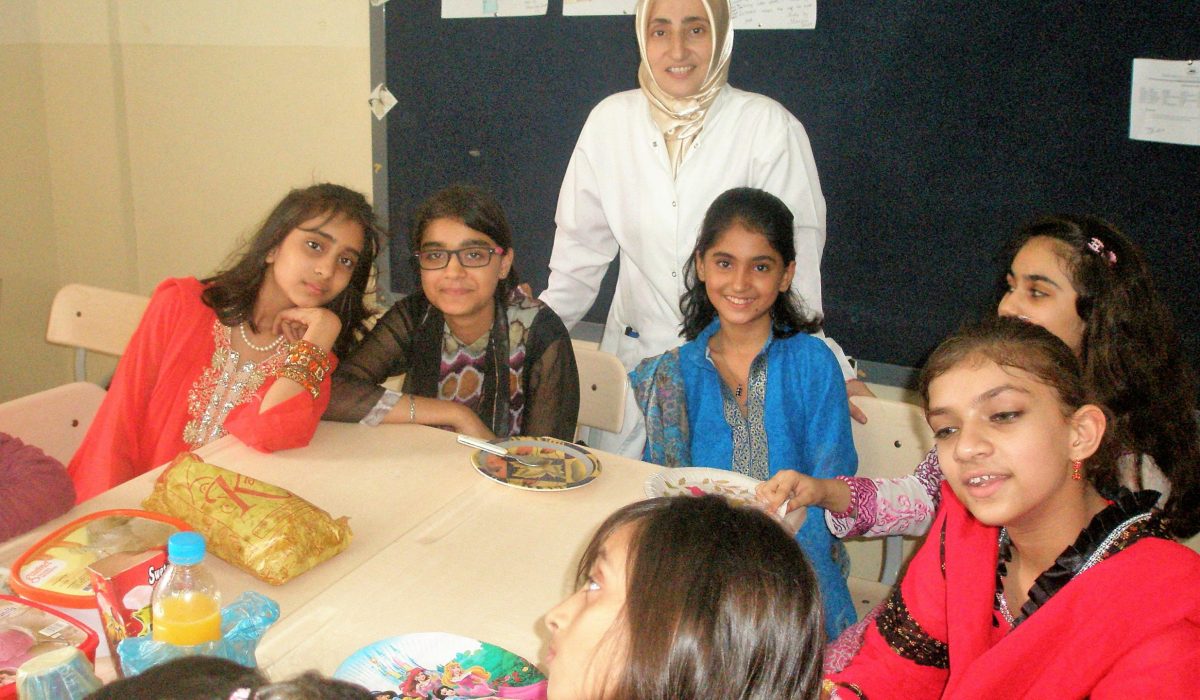Turkish Teacher Ayşegül Karahan: Pakistan was tough but beautiful

Pakistan’s sad day: 62 people died in train crash
June 7, 2021
A Page from History: Medical support from Sakarya doctors to flood survivors
June 9, 2021During the hours we talked with Ayşegül Karahan, who taught Turkish at the PakTurk Schools, about her life in Pakistan, the sentence she most often repeated was: “It was tough, but it was beautiful!” This meant her effort to reach people despite all kinds of troubles and shortcomings, her devotion to her students, and her approach towards her work as a “sublime service” conducive for gaining Allah’s approval rather than a mere profession.
Mrs. Ayşegül does not consider her going to a different country like Pakistan from both geographically and socially comfortable and spacious climate of the Black Sea Region as a sacrifice. According to her, despite all their mistakes, flaws and inexperience, the people of Pakistan, who embraced a young teacher and trusted their children to her care, made the actual sacrifice.
We present you the first part of the interview we made with Mrs. Ayşegül, who started to live in Germany with her family after leaving Pakistan, accompanied by tears and smiles.
-May you briefly describe your life before going to Pakistan?
I am from Trabzon. I graduated from the Karadeniz Technical University Department of Classroom Teaching in 2002. I worked as a dormitory manager in Trabzon for 3 years and worked in various jobs such as public relations management. I also worked in Gümüşhane for 2 years. In 2007, I went to Pakistan to teach there.
-Why did you wish to go abroad? What were your feelings?
Frankly, it was not in my dream to go to a Muslim country. While I was studying at the university, I dreamed of going to the countries where Turkish schools in need of teachers were. Indeed, an epic was written through the services rendered by those schools. We envied those educators we heard in the stories and cherished the educators who arrived from those schools. I was thinking, “May I also become a part of that saga too?”
After graduating from the university, I wished to go abroad and work as a teacher, but my family did not allow. I am the youngest of five siblings. Everyone got married and left, I was left alone at home. There were many people who thought they had a say over me. Moreover, I was already working in another city. I was separated from them. They did not interfere with my marriage, they could not object.
-How did you persuade them about Pakistan?
In fact, they did not agree. When I met my husband, he was in a different country, but he had decided to go to Pakistan. When my husband and his family visited my hand to ask my hand, my father left the house. Despite everything, I did not give up on my decision. We got engaged and he went to Pakistan. We remained engaged for a year, and I continued my teaching duty. I went to Pakistan after our wedding in 2007. After I left, I later learned my father had suffered a partial stroke. It was really hard to leave my family and go there.
-What did you know about Pakistan before you went there? Did you make any research about the country?
Back then, we didn’t have smartphones; we didn’t have Internet access all the time and everywhere. Researching was not easy. I had watched the three-episode Pakistan documentary of the Ayna (Mirror) globetrotting program on the Samanyolu TV many times. I was so excited. Of course, all my feelings and concerns were formed around the sublime notion of ’emigration’ first. When I went there, I also faced the facts of life.
I WAS HORRIFIED TO LEARN WE HAD BEEN IN THE SAME ROOM WITH A LIZARD
What kind of facts were those?
I never regret going there. I really wanted my children to grow up in Pakistan. However, it was really hard in terms of living conditions. What kept me there were my students, the parents, and the people I loved and valued. Perhaps the greatest grace of Allah is making people love the places they go.

Social life in Peshawar, the city where I first lived, was more difficult because there was Taliban influence. Few women were driving. We were also struggling with that norm. Whenever we went to the market, we cared so much about the way we were dressed. Sometimes I used to take a veil. I grew up very comfortably in Turkey. I was very free to act on my own. I could not speak English when I went to Pakistan. I was dependent on my husband in terms of language and communication. Initially, we also did not have a car. While I was living there, Allah made me love there. I still love the people of that city.
-What were your first impressions?
When I first landed in Peshawar, I saw people lying on roadsides and I could not understand why. We were leaving the airport in an air-conditioned vehicle and I hadn’t realized how hot it was yet. Friends said the people lying on the roadsides were trying to cool themselves off with the wind the passing cars left in their wake. When I got out of the taxi and faced the hot weather in front of the house where we would stay for the night, I realized the helplessness of those people. The power also went off that night. Until the morning, I could not sleep a wink and tried to cool off. In the morning, my hands and feet were blistered from itching.
On the first day in the house where we were taken as guests and when our host colleagues went to school, I wanted to do the cleaning. I entered the kitchen. I saw somethings like rat droppings here and there. I became so afraid and I showed them to my husband. “It’s not a rat or a mouse. It’s a lizard that left them!” he said and pointed to the huge lizard standing in front of the window of the room where we had slept at night. It turned out I had not seen it in the darkness of the night. At first, I was relieved that ‘it was not a rat or a mouse’ but I was horrified when I realized that we had been in the same room with that lizard.
-What did you experience while communicating with the local people? Did cultural differences affect your lifestyle?
Two months after I arrived in Pakistan, I started teaching Turkish at the PakTurk School there. My husband was a biology teacher there as well. I was the only Turkish female teacher in that school. I attended to the classes with a dictionary in hand. I had a Pakistani colleague and she knew a few Turkish phrases, enough for her to start a conversation. Sometimes when I was so depressed, she would come to me and say “Have you missed your mother? I’m mother, put your head here,” and point at her shoulder. Since there were no other Turks, I was always with my Pakistani friends. Over time, we developed a very close relationship.
WAS IT HARD FOR US TO GET USED TO THEM OR WAS IT FOR THEM TO GET USED TO US?
One day, one of those Pakistani female teachers said to me, “We have a family function in the evening, I want you to attend it too.” Earlier, I had attended to some of their traditional gatherings such as the wedding dinner receptions. That time she uttered a ceremonial name which I hadn’t heard before. I didn’t ask her what it was and I said to myself “I would look it up in the Urdu dictionary”, but I couldn’t find it in the dictionary. The locals spoke Pushto there. I also asked my husband and colleagues; they had never heard of that word either. Since that was not a wedding, I thought it would be something like a circumcision ceremony. I bought a huge toy plane from the market, got it gift-packed it and went to attend to the function in the evening. When I saw that the tents had been set up and illuminated in the open, I said to myself, “Okay, there is definitely a function here and it is absolutely for ladies only.” The men were outside, so they let me in. A little while later, a young man entered the large tent and his family and friends began to apply henna on his hands. It turned out that for the young men who were going to get married, months before the actual wedding, their maternal and paternal aunts would hold such in-family henna functions. That was something that only applicable for Peshawar and its region. My teacher friend had organized the function. I asked her, “I thought the function was about celebrating a child’s circumcision; what are we going to do with this gift, now?”

When I look back and think, I ask myself “Was it hard for us to get used to there or was it hard for the people there to get used to us? Was ours a sacrifice or theirs?”. It seems to me theirs was a greater sacrifice than ours.
What kind of sacrifice do you think the people of Pakistan made?
I check my memories, for example, and I remember I had committed many blunders. I had done things that did not fit their culture; things which seemed normal to me but were strange to them. Yet, people always embraced me. They made the real sacrifice by accepting me there. No matter how distant we may have been in terms of culture, they included us in everything. They had laughed a lot at my gift on occasion of that henna function, but my friend had also said, “Come on, you have not done something strange. We had another Turkish friend before you; since she did not know Urdu, she would mistake our songs for hymns and would be moved to tears as well.”
They were really friendly people. Once when I had seen some grapes on the way, I had said, “We use grapevine leaves in our cuisine”. Later that friend had found and brought some vine leaves for me. There were such heartfelt people.
IT TOOK ME THREE MONTHS TO NOTICE THE BABYSITTER WAS A CHRISTIAN
Whenever I went to the market, some vendors would ask me, “Are you Iranian?” and “Are you Muslim?” as well. In a place where I went with the sense of emigration, the question “Are you Muslim?” was not something that I liked hearing so often. Even when I said, “Yes, I am a Muslim”, they would not believe me immediately and would fire another request, “Please recite Surah al-Ikhlas, then.” There were too many Christians there and they were veiled too. They traditionally dressed the same like many others. It took me three months to realize that my babysitter was a Christian. She would say whatever I used to recite while I was rocking the baby: “Hoo Allah! Hoo Allah!” She greeted me no different than a Muslim. When she came to me one January and said, “My holiday is around the corner. Will you excuse me?” I realized it. We used to go to the school together and I would trust the baby to her care. My local teacher friends did not realize it either; they lived very closely together with others in the society.
-How was your rapport with the students? Did you have any difficulties?
Peshawar signified the most beautiful period for me when I was a novice in guidance and counselling in an overseas educational institution. Some of those schoolchildren graduated from the university, but they still write to me. I used to invite my students to my home for guidance and counselling programs. Going to a teacher’s house was a very different experience for them. It was a great sacrifice for the families to allow that as well. Under normal circumstances, they would not send their daughters to any other house where people whom they did not know lived.

Four years after I left there, I got a message from a number I did not know. It read, “Teacher, I graduated from the high school. I qualified to be placed in a medical school and I’m in my first class today. I took my seat and thought of you first. You were the first person I wanted to share this feeling with.” It was written by one of my students. Those kids were really distinctive to me. Another student of mine is currently in India. Wherever I go, even if my number changes, she finds me and texts me on days of importance.
I had another student. Her father had passed away, and her mother’s psychological condition was not so good. Years later she found me and wrote to me, “Teacher, the best days in my life were the days I spent with you. Now I feel so alone. Since I had the best times with you, I wanted to write to you now.” They were really different, very smart kids. They had a keen skill for learning new languages. I used to blend my lessons with games and jokes so that the words they learnt would become permanent. Classes used to pass with great fun. They used to confuse the Turkish words for ‘to be’ and ‘to buy’ a lot. In one of the exams, a student had written, “I want to be cheese!” and I kept on pestering her tongue-in-cheek saying, “I wish you were something that Pakistanis loved. Why do you want to be cheese? Nobody likes eating cheese in Pakistan, etc.” 😊 When I went to Peshawar for a group meeting four years after left there, that girl heard about my arrival, so she visited me and said, “Teacher, I am your student who wanted to be cheese, remember?” Afterwards, every time she texted, she introduced herself by saying “I’m the girl who wants to be cheese”.
HE LEARNED FIRST ENGLISH THEN TURKISH TO COMMUNICATE WITH US
When Benazir Bhutto, one of the former prime ministers of Pakistan, was assassinated in 2007, large protests took place everywhere and it was chaotic. Bombs exploded in the city. At that time, our spouses had been to an academic program outside the city and as Turkish women, we were alone in the city. We gathered in one house as three women and our children. A friend of ours had an upset stomach. In that rush, we called one of our parents. Despite all the dangers, he came and took us to the hospital. I thought according to our previous conversations that the parent knew English. He was talking to us moderately. As I learned English over time, I realized he did not know English either. He tried to learn spoken English so that he could talk to us. Later, he also tried to learn Turkish. He and his family members also made great efforts to communicate with us fluently.
Due to the shortage of teachers in the middle section, I was also taking the Turkish classes for the secondary school male students. One day, as I was entering the Grade 7 classroom, I winked at one of the children and said, “How are you?” I used to use my facial expressions a lot. The children were surprised to see that. All of them said, “Wow!” and it turned to the talk of the class. I was surprised, but I explained that that gesture did not have a bad meaning in Turkey; it was an expression of sincerity to the people we cherished and I closed the issue. When I went downstairs to the teachers’ lounge after that class, I asked to my colleagues, “I winked like this in Grade 7, what does that this gesture mean in Pakistan?” Everyone said “Wow!” once again. It turned out that it meant entirely different than our understanding. I’m telling this so that I can truly express how benevolently the people there accepted us. They accepted us with our every shortcoming and embraced us.
When I first went to Pakistan, I could not pronounce the students’ names properly. I taught them the Turkish pronunciation of their names. For example, if the student’s name was Javeria, I would address her with the Turkish equivalent “Cevriye” and say, “From now on, you are Cevriye in this class!” The students accepted this and whenever I asked them their names, they would pronounce their names in Turkish. This was not normal and not everyone would agree. This was how the children used to write their names on their exam papers. When I was to feed the exam results into the computer, I used to look for their names in the school roll so that I would not commit any mistakes while assigning marks. 😊
To be continued…
Next: Years in Karachi and Islamabad …





No Comment.